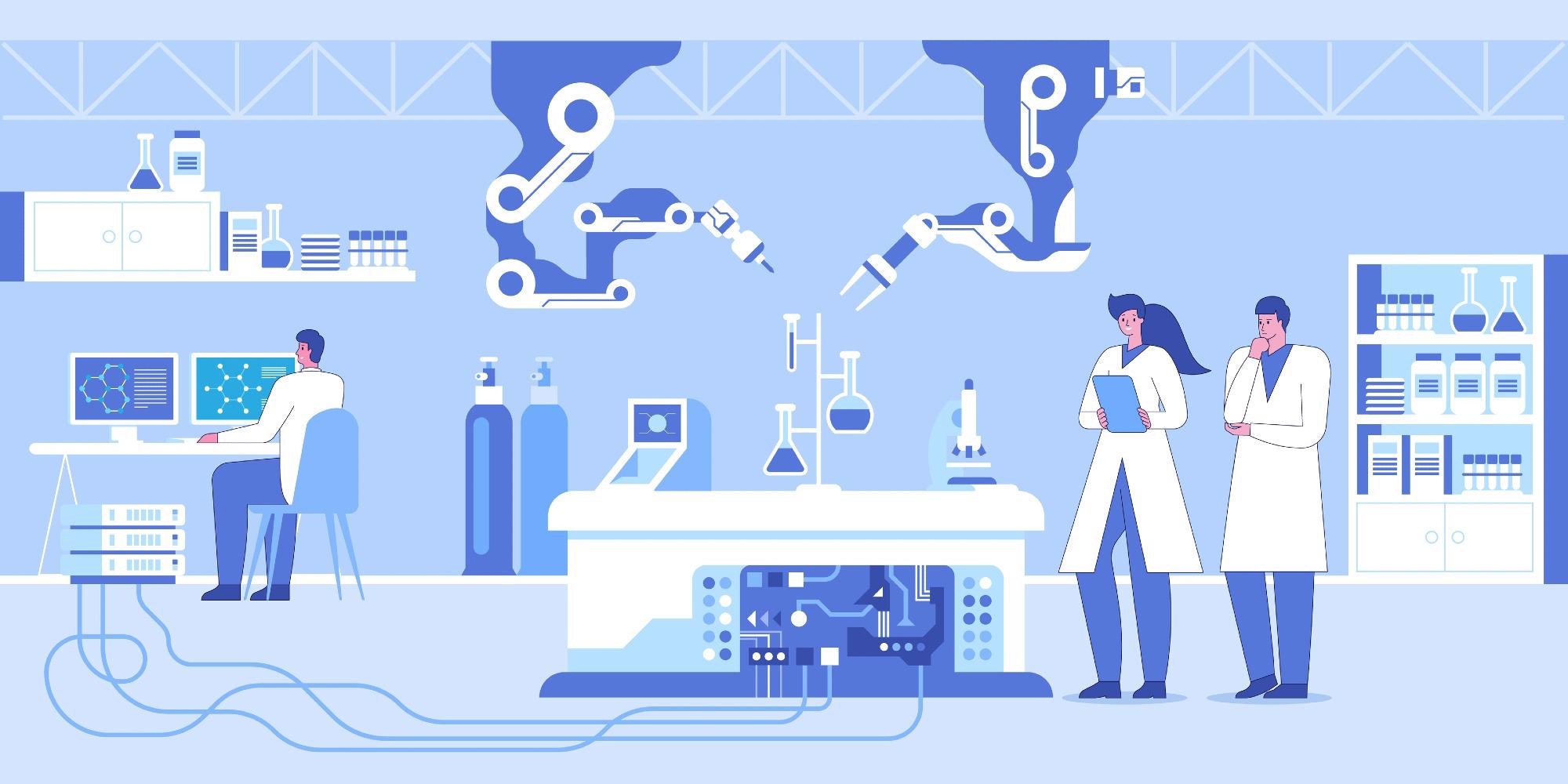Intelligent automation is changing many industries. By leveraging artificial intelligence (AI) and robotics, intelligent automation is streamlining processes and intelligently saving time and resources, and facilitating innovation.
The central feature of intelligent automation is AI. Machine learning together with complex algorithms are used to analyze intricate data inputs. Intelligent automation then makes decisions based on the outcomes of these analyses.
The pharmaceutical industry is one of many sectors that it benefited from and is being changed by intelligent automation. The Covid-19 pandemic caused the industry to become overwhelmed by increasing demand while forcing it to manage challenges to supply chains, staff, and management of clinical trials. Intelligent automation emerged as a solution to all these problems. In particular, the pharmaceutical industry is significantly advancing the field of drug discovery and development through its implementation of intelligent automation, although many other spheres are also benefitting. Here, we will discuss what is intelligent automation and focus on how it is being used in the pharmaceutical industry.

Image Credit: Ico Maker/Shutterstock.com
Drug discovery
Intelligent automation offers the possibility of enhancing the drug discovery process and already, many automated systems have been successfully implemented in this space. Medium-throughput and high-throughput platforms have already become the standard in drug discovery practices. These systems have been used for a variety of tasks that were once time-consuming and very expensive such as computational molecular design and hit finding. Via the use of automation, these tasks have been optimized. However, the full integration of intelligent automation in this area has not yet been achieved.
Recent advances in technologies such as ‘organ-on-a-chip' and AI will likely encourage the full integration of intelligent automation into drug discovery. The benefits of adopting such automation include; fewer errors in measurement and data, reduced reliance on resources (materials and staff), shortened timeframes (appropriate drug candidates are discovered more rapidly), enhanced molecular designs to suit relevant biological end-points (fewer errors).
Given that there are more than 1060 known molecules with the potential for use in therapeutics, the opportunity to speed up the process while reducing error rate and cost, is significant. Intelligent automation will likely facilitate the discovery and development of many key therapeutic agents in the coming years. This will be of vital importance to many therapeutic areas. While many new drugs get market approval every year, there is still an urgent need for new and more effective therapeutics for almost all diseases.
Patients are in need of drugs with better efficacy and fewer side effects, and scientists continue to search for cures rather than just treatments. Additionally, personalized medicine has emerged in recent years as scientists increasingly recognize the need and the value of medication that is not one-size-fits-all.
Automation is helping to filter through vast libraries of candidate molecules to intelligently select those that are most likely to be successful therapeutic agents. It is also aiding the design of drugs so that they have better affinities to their intended target and fewer side effects. Overall, intelligent automation represents a shift in the entire drug discovery and design process.
Clinical trials management
Clinical trials were significantly impacted by the COVID-19 pandemic. Some were delayed and worse, some were canceled. The disruption caused by the pandemic highlighted the vulnerability of clinical trials, which has ushered in a change in the form of the implementation of intelligent automation.
AI is being used to ensure consistency of data collected, as well as improve quality control and data accuracy and limit errors. intelligent automation is reducing the role of physical members of staff and streamlining the clinical trial process. Intelligent automation will likely be utilized for more applications in clinical trials management in the coming years.

Image Credit: paulista/Shutterstock.com
Supply chain & inventory management
The storing and management of pharmaceutical supplies require a great deal of planning and administration. Often, locations that store pharmaceutical supplies oversee thousands of products in stock. Additionally, pharmaceutical products frequently require specific storage requirements, such as refrigeration. The adoption of intelligent automation in pharmaceutical supply chain and inventory management is streamlining procurement and shipping processes, allowing for efficient supply and demand planning while bringing down the associated costs.
Compliance and regulatory requirements
The pharmaceutical industry is governed by strict guidelines to keep people safe. Errors in this field could be life-changing and even fatal. To help the industry comply with regulatory requirements, intelligent automation is being leveraged to mitigate risk and reduce the possibility of human error.
The future for intelligent automation in pharmaceuticals
The integration of intelligent automation in pharmaceuticals is yet to reach its full potential. In the coming years, we will likely see continued improvement, new technology, and new applications of intelligent automation in this sector. As a result, drug discovery and development will be further optimized, clinical trials and supply chain & inventory management will be more efficient, and regulatory guidelines will be more easily adhered to.
Sources:
- Paul, D., Sanap, G., Shenoy, S., Kalyane, D., Kalia, K. and Tekade, R., 2021. Artificial intelligence in drug discovery and development. Drug Discovery Today, 26(1), pp.80-93. https://www.ncbi.nlm.nih.gov/pmc/articles/PMC7577280/
- Schneider, G., 2017. Automating drug discovery. Nature Reviews Drug Discovery, 17(2), pp.97-113. https://www.nature.com/articles/nrd.2017.232
- Zhu, H., 2020. Big Data and Artificial Intelligence Modeling for Drug Discovery. Annual Review of Pharmacology and Toxicology, 60(1), pp.573-589. https://www.ncbi.nlm.nih.gov/pmc/articles/PMC7010403/
Further Reading